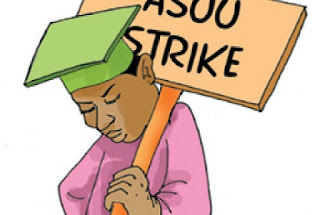AS FG, ASUU meet to resolve the protracted strike
It was cheery news to hear that the Federal Government is desirous to end the strike embarked on by the Academic Staff Union of Universities (ASUU). Since November 4, ASUU had downed tools in all public universities in the country. The university lecturers had complained that government has exhibited unparalleled bad faith in the fulfilment of the agreement they reached almost ten years ago.
They said that at every turn the issues arose, government either displayed nonchalant disposition to fulfilling the letters of the agreements, or always defaulted even in the new resolutions arising from such agreements. In particular, ASUU had expressed grave concern that government was reluctant in adequately funding the nation’s universities.
ASUU is demanding among other things, that government should fund research at the universities, build and maintain students’ hostels, construct enough classrooms and provide teaching aids and facilities that would bring about conducive learning in the universities.
While Nigerians feel that successive regimes paid hypocritical attention to issues of revitalizing falling academic standards in all strata of the nation’s educational sector, government maintained that it was not primarily responsible for the falling standard. But the back and forth attitude of government in the entire saga, has not helped matters. The inability to keep to agreements portray government as being interested only in acts that portray it as being interested in playing games akin to Advance Free Fraud (419).
However, there seems to be light at the end of the tunnel. Just last Wednesday, the minister of Labour and Productivity, Dr. Chris Ngige, issued a statement saying talks will resume to seek means of resolving the impasse. This statement has therefore, rejuvenated hope of possible resolution of the matter.
According to Samuel Olowokere, the Director of Press at the ministry “A meeting has been convened for Monday, December 10, 2018, at the Conference Room of the Minister of Labour and Employment”.
He stated that the minister had sent back the dispute for conciliation at the Federal Ministry of Education, having noticed that both parties have not exhausted the internal conciliation mechanism.
“Knowing that ASUU and her members are on essential services as contained in the Trade Dispute Act, the minister has therefore directed that the matter is re-apprehended back into his ministry to avoid unnecessary meddlesomeness by external interlopers as well as to ensure speedy resolution of all issues to enable ASUU to call off the strike.
“By this, all further discussions between the Ministry of Education and ASUU will now recommence at the Federal Ministry of Labour and Employment,” Olowokere said.
It is hoped that the issues in dispute will be amicably resolved this time around. It is important that a resolution be reached because all is not well with the nation’s educational system. It is equally disheartening that tertiary education which should be the citadel of learning as in other climes, has not impressed Nigerians.
For instance, it is assumed that had the universities lived up to expectation, the myriad of problems, both technological, scientific and managerial, could be easily resolved. But, due to the fact that academic works in Nigerian tertiary institutions are disrupted by intermittent strikes, the level of scientific discoveries or solution to identified problems has been much lower.
It is beyond the understanding of ordinary people that the Nigerian universities cannot find immediate and lasting solutions to some of the basic problems they face: issues of inadequate water supply, poor sanitation, epileptic electricity supply, terrible road network on campus and inadequate infrastructure generally. But how can they even attempt to do such when staffers of our universities are most often on strike.
And that is one of the primary reasons for the dwindling academic standards in our tertiary institutions and poor knowledge level of our graduates. When undergraduate programmes have turned to crash programme year-in, year-out, how can they measure up in standards, not to talk of improving on quality?
If Nigeria should rely on importation of virtually every household and industrial need, could it not be attributable to low-level research findings? With our university dons being provoked to the point of always embarking on strikes, we need no soothsayer to realise that the nation can’t make appreciable progress in the circumstances.
We should do everything humanly possible to find lasting solutions to the issues that have transformed our university lecturers to permanent “strikers”. The AUTHORITY therefore supports the current moves by the Federal Government to finally rest the issues. However, care should be taken to ensure that those nominated to be at the dialogue table, on the part of both the Federal Government and ASUU, do not go there to further their selfish interests as was being insinuated.
Part of what could be done is to pay them sitting allowance based on achievable outcomes and not on the number of days they sat at the dialogue table. Also, people whose duty it is to advise government on whatever decisions to take, should not collect any remuneration except the items listed on such agreements have been fully implemented. That is one way to halt these back and forth movements. Enough is enough and time to sift out all intervening variables has come.
